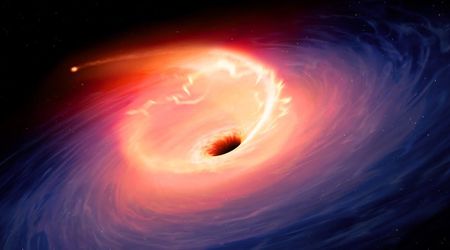What time is it in space?

In the vast cosmos, where celestial bodies glide across the fabric of spacetime, and galaxies spin in the infinite dance of the universe, one question often puzzles the curious mind: What time is it in space?
The concept of time, as we understand it on our little blue planet, is intrinsically tied to Earth's rotations and revolutions, following a rhythm that has guided human life for millennia. But once we step beyond our terrestrial bounds, into the silent void of space, does time still hold the same meaning?
Let’s put on our pretend astronaut suits and fly off into pretend space to investigate!
Table of ContentsWhat time is it on the International Space Station?
The International Space Station (ISS) uses Coordinated Universal Time (UTC), which is essentially the same (successor) as Greenwich Mean Time (GMT). This decision was made because the ISS is a cooperative effort between various space agencies from around the world, including the United States' NASA, Russia's Roscosmos, the European Space Agency (ESA), and others. Using UTC helps standardize time for all parties involved and makes mission planning much more easier for ground control and the astronauts. The ISS orbits the Earth roughly every 90 minutes, experiencing 16 sunrises and sunsets every day so it was necessary to sort of synchronize everyone into a single, consistent timezone.

What time is it on the Moon?
There is currently no lunar timezone established because there are no permanent residents or operations on the Moon necessitating a standardized system of timekeeping.
Timekeeping on the Moon during missions is typically based on the Earth time zone of the mission control center managing the mission. For example, during the Apollo missions, NASA used Houston, Texas time (Central Standard Time or Central Daylight Time, depending on the time of year).
But this is about to change, because as we all know it, Space Agencies, both US and Chinese, are ramping up their lunar project, including the Artemis missions, and other habitats on the Moon. Upcoming missions like NASA's Gateway station, which will serve as a multipurpose outpost orbiting the Moon and the European Space Agency's Argonaut lander will require coordinated operations, potentially relaying communications and performing joint observations.
In light of these upcoming missions, the European Space Agency (ESA) and other space organizations are now considering the establishment of a "common lunar reference time" which could be universally accepted and used by all lunar systems and users.
We’ll be sure to update this article when the decision-makers have come to an agreement on this.

What time is it on Mars?
On Mars, a day – known as a "sol" – is slightly longer than a day on Earth. A sol is approximately 24 hours and 39 minutes. This means that if you were to use a 24-hour clock on Mars, the time would slowly drift out of sync with the Sun over the course of several weeks. In practice, scientists working on Mars missions operate on "Mars time" for a while. They will adjust their work schedules to match the Martian Sol. This was the case for the teams working on the Mars Rovers, for instance. When a rover was in operation, the team would start work at the same solar time on Mars each day, which meant their start time on Earth would shift by about 40 minutes later each day.
Mars does not have time zones like Earth. The concept of time on Mars is generally handled on a global scale as "Mars Coordinated time" (MCT), rather than being divided into regional time zones. As mankind starts colonizing the red planet, scientists will need to create a proper Martian timezone, but for now, with missions being primarily completed by probes, landers and rovers, regional timezones are not needed. If you are curious to know what time it is on Mars right now, check out this live Martian clock.

What time is it in the outer solar system and deep space?
The concept of time as we understand it on Earth becomes even more complex and abstract when we extend our scope to the outer solar system and deep space. Unlike on Earth, there are no day-night cycles or seasons to mark the passage of time in deep space. Thus, the standard time conventions we use on Earth don't apply. In terms of spacecraft exploration, missions operate on what's known as "mission elapsed time," which begins at the launch of the spacecraft and continues throughout the mission. The onboard clocks on these spacecraft are typically synchronized with Universal Time (UT), and communication between the spacecraft and Earth is carefully timed to account for the time it takes for signals to travel at the speed of light. For example, the Voyager spacecraft, which is now in interstellar space, still communicate with Earth, and their signals take over 17 hours to reach us. That time delay is a crucial factor when sending instructions to the spacecraft or receiving data. In terms of astronomical time, distances in the outer solar system and beyond are often measured in terms of light-years or parsecs, which denote the distance light travels in a year. This is a reflection of the vastness of space and the enormous scales involved when discussing the cosmos. If humans ever manage to travel or send more advanced probes to the outer solar system and beyond, we may have to devise new systems of timekeeping suitable for those environments. However, as of now, such ideas are mostly in the realm of theoretical discussions and science fiction.










